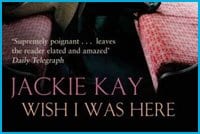Jackie Kay made her mark in 1991 with The Adoption Papers, an autobiographical poetry collection about being a black girl adopted by a white Scottish couple. Since then, she has published three more books of poetry, the award-winning novel, Trumpet, and several books for children. But it’s her collections of short stories, including the new-to-paperback Wish I Was Here, that truly establishes her as a force of nature.
Wish I Was Here is a thematic work, which at first made me wary, especially because the theme is love. But Kay’s writing doesn’t falter beneath the weight of such a potentially clichéd subject. She delves into heartbreak, jealousy and notions of fidelity from varied, and sometimes astounding, perspectives.
“What Is Left Behind” is a first-person narrative about a woman cheating on her husband with another woman. Rather than simply describe the lovers’ interactions, Kay chronicles the love affair through descriptions of all the motel rooms the women have shared. “Room 99. Room 491. Room 22. Come in. Room, Room, Room. Oh Room. Oh God. Please. Oh my Room 55. Room with a broken curtain rail. Oh, please. Room with the vulgar wallpaper. Don’t stop.”
Kay skillfully moves her stories from hot to hilarious to lump-in-your-throat sad. The key to her storytelling is voice. You hear her characters clearly in your head, whether it’s a young Eastern European lesbian confessing her sins to a stranger on a train, two older Scottish bears who’d risk anything for each other, or a straight Irish workman who’s obsessed with his mother. Kay’s grip on the personality of speech is electrifying.
She doesn’t shy away from experimentation, either. Kay writes in first-, second- and third-person, and as both men and women. Sometimes she switches voice (and language) within one story. In “What Ever,” Kay combines four birds with two narrative perspectives to describe the stages of an old woman’s life. The section “Robin” is a monologue entirely in Scots English, a language Kay returns to throughout the collection.
“You Go When You Can No Longer Stay” and “Pruning” contemplate the little cruelties of lost love. Both are tales of lesbians whose lovers are having affairs. Kay painfully illustrates the denial we often embrace, the ways we lose ourselves in relationships and the extremes we go to in order not to be alone. And yet there is always a spark of humour and glow of hope, like when the woman in “Pruning” destroys her lover’s underwear and says to the reader, “It is addictive, by the way, cutting up thongs.”
Wish I Was Here moves back and forth between this kind of realism and Kay’s own brand of magic realism. In the comical “Not the Queen,” a Glaswegian woman is cursed with the exact same face as Queen Elizabeth II and grows tired of being mistaken for her. In the oddly moving “My Daughter the Fox,” the narrator literally gives birth to a fox, and debates whether to let her run wild when she grows up.
Jackie Kay’s stories are ruthlessly honest and unapologetically imaginative. There’s no other writer like her.

 Why you can trust Xtra
Why you can trust Xtra


